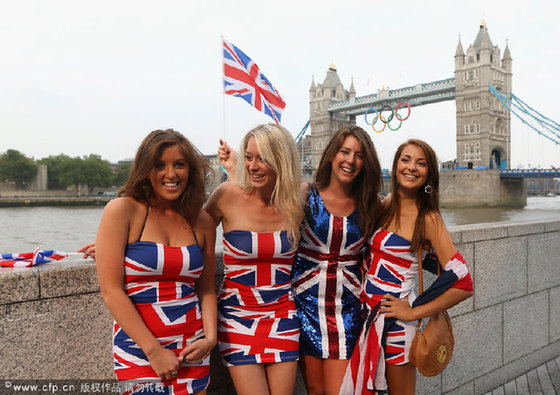London Olympics plays to Britain's strengths
- By Tim Collard
 0 Comment(s)
0 Comment(s) Print
Print E-mail China.org.cn, August 11, 2012
E-mail China.org.cn, August 11, 2012
|
|
|
Katie Wood, Claudia Oreia, Tanie Barnes and Lucy Freeman (left to right) pose for a picture in front of Tower Bridge ahead of the Opening Ceremony of the London 2012 Olympic Games on July 27, 2012 in London, England. |
Hosting the Olympic Games has been one of Britain's greatest challenges of the last few years ― for starters, the spectacular 2008 Beijing Games was a pretty tough act to follow.
The style of the opening ceremonies demonstrated the different cultures and attitudes of the two host countries. This was not a rejection of the image created by the glorious and beautifully-choreographed Beijing ceremonies, but rather a demonstration of our own country's special flavour, with no disrespect meant to anyone else's. China's show was a major collective effort, marshalling huge numbers (one of China's best-known characteristics) in a powerfully ordered and disciplined display, which showcased the country's strengths.
There was no point in Britain trying to imitate the Beijing spectacle. Economic times have changed since 2008, and we had to save money. Labour and the services of contractors are more expensive here than in China. Also, we don't have the discipline; our strength is more in individual flair and variety. Thus, our ceremony was less ordered, but just as full of surprises in its own way; it aimed at entertaining rather than inspiring awe. And it also showed the great British talent of making us laugh at ourselves ― our eighty-six-year-old Head of State, a superbly dignified Queen for sixty years, was happy to lay aside pomp and circumstance and join in the show, to the delight of her subjects.
Obviously there was no way we expected to be able to copy China's feat in winning the medal count at her own Games ― we just wanted the world to come to London and have a good time, and not to disgrace ourselves. Britain excels at a number of events, namely cycling, rowing, riding, and canoeing ― in which we fear no competition on earth. Perhaps it says something about the British character that all these are sports performed in a sitting position. Of course we were never going to beat China in the medals table; but I can't resist pointing out that we did win two-thirds of China's medal haul with less than 5 percent of her population!
Inevitably, there have been rumours floating around concerning drugs and other illegal practices. This is always sad, whether or not the rumours turn out to be correct. Of course, given the sorry history of drugs in sport, testing has to be stringent; but there is no reason for anyone to point the finger at any country in particular. Athletes from all major countries have been caught out at one time or another in the past. It is particularly sad that Ye Shiwen's swimming triumph should have been marred by allegations for which there was no evidence. It must be terribly hard for a 16-year-old to be hailed as a champion and dismissed as a cheat on the same day. I would think that the strictness of the Chinese training regime is an easily adequate explanation for the excellence of China's young performers.
This, of course, brings us to the real intercultural problem with the Olympics. The Olympic motto of "Citius, Altius, Fortius" (Faster, Higher, Stronger) is taken more seriously by some cultures than by others. There are cultural differences in the sacrifices people are prepared to make, or demand, in the pursuit of excellence. We British do have a few who really are prepared to reach for the skies, and we honour them sincerely every four years. But, for most of us, sport remains a thing to be played at weekends for enjoyment and recreation, if not to be watched on television, while holding a glass of cold beer.
The whole Olympic idea revolves around the world getting together to display its best endeavours. And the quadrennial change of venue enables different nations to show the world what they have to contribute. In 2008, we saw China's collective, disciplined drive for excellence, and this year we witnessed Britain's individualism, eccentricity and occasional brilliance. In 2016, the world will turn its eyes to Rio de Janeiro. We don't yet know who will win all the medals, but anyone who has attended Carnival in Rio will know that the Brazil Olympics should be anything but drab.
The author is a columnist with China.org.cn. For more information please visit: http://www.ccgp-fushun.com/opinion/timcollard.htm
Opinion articles reflect the views of their authors, not necessarily those of China.org.cn.






